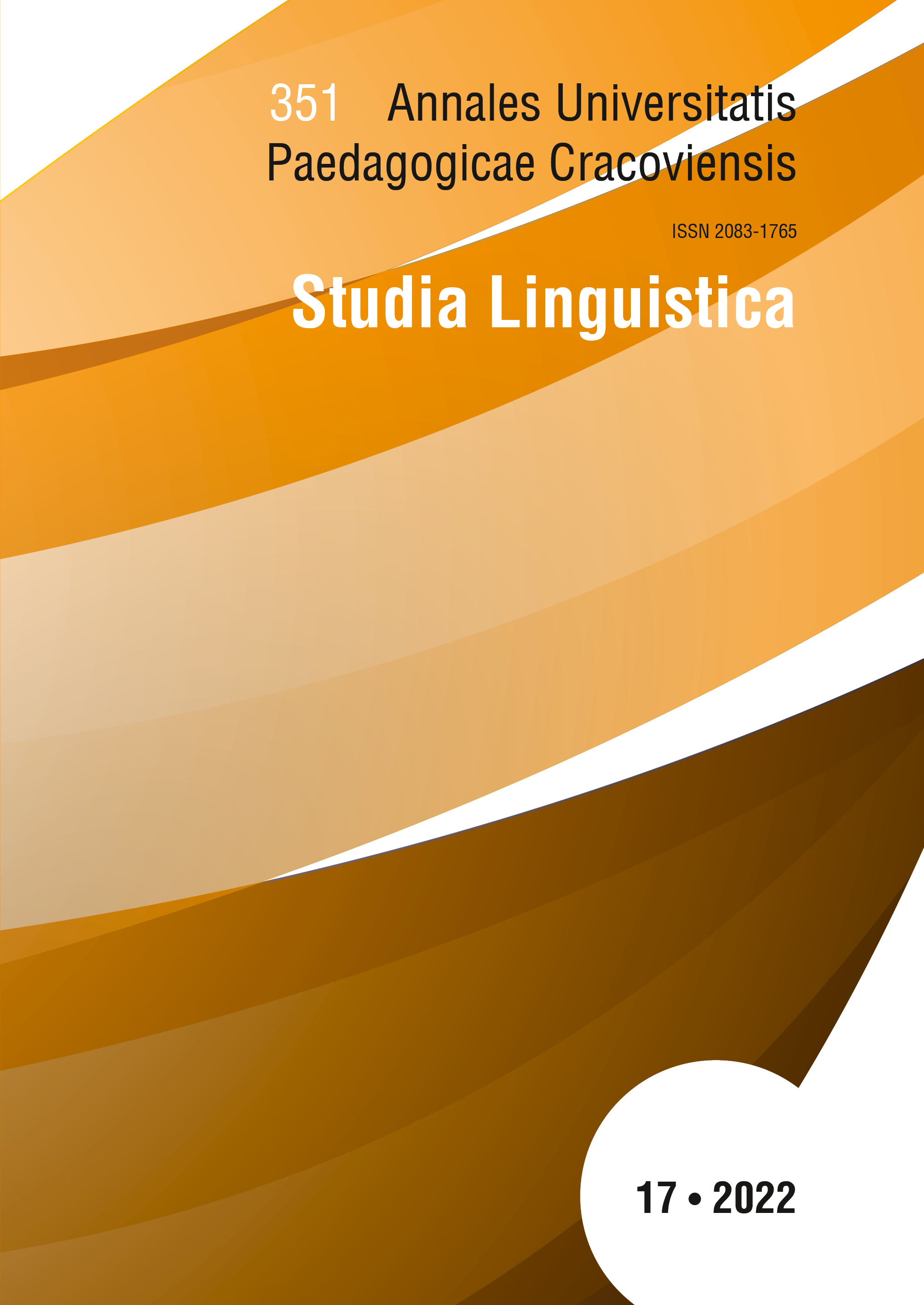Lexical representations of the concept of Holy Mass in the Middle Ages. Onomasiological analysis
Main Article Content
Abstract
In the article, the subject of description included continuous and discontinuous auto-semantic lexical units used in the medieval language (until the end of the 15th century) which are a lexical representation of the concepts of Holy Mass in the Słownik pojęciowy języka staropolskiego online [Conceptual Dictionary of Old Polish online]. The result of onomasiological works on the vocabulary gathered within the concept of HOLY MASS in the Słownik pojęciowy języka staropolskiego [Conceptual Dictionary of Old Polish online] is the categorization of this lexis within subordinate concepts. They include lexical units referring to the name of the service, the maner of its celebration, sermon, sacrifice, rite of peace, holy communion, final blessing, and items related to the holy mass.
Downloads
Article Details

This work is licensed under a Creative Commons Attribution-NonCommercial-NoDerivatives 4.0 International License.
Author, submitting a text to the editorial board of the journal “Annales Universitatis Paedagogicae Cracoviensis. Studia Linguistica", certifies that the content of the article has not been published so far and that the work does not violate in any way the copyright or related rights of other person, as well as other rights of third parties, and that no one's rights to the work (or any part thereof) have been missed. After signing the contract, the property rights to the published materials are transferred to the University of the National Education Commission, Krakow.
“Annales Universitatis Paedagogicae Cracoviensis. Studia Linguistica” is an open access journal, and all its content is made available free of charge to users and institutions under the Creative Commons CC-BY-NC-ND 4.0 license (attribution, non-commercial use, no derivative works). Under this license, the authors agree that their work may be lawfully reused for any purpose, except for commercial purposes, without the prior consent of the author or publisher. Everyone can read, download, copy, print, distribute and process these works, provided that the author's marking and the original publication place are correct. Published texts may not be used to create derivative works (e.g. to translate and publish in another language without the consent of the publisher). This is in line with the BOAI (Budapest Open Access Initiative) definition. "Studia Linguistica" does not charge for submitting or processing articles.
References
Boryś W., 2005, Słownik etymologiczny języka polskiego, Kraków.
Google Scholar
Cichy S., 2012, Teologia Eucharystii, [w:] Mysterium Christi 3. Msza Święta, red. bp W. Świerzawski, Zawichost–Kraków–Sandomierz, s. 79–120.
Google Scholar
Katechizm Kościoła Katolickiego, 2002, II wydanie poprawione, Poznań.
Google Scholar
Koperek S., 2012, Rys historyczny rozwoju liturgii mszalnej, [w:] Mysterium Christi 3. Msza Święta, red. bp W. Świerzawski, Zawichost–Kraków–Sandomierz, s. 37–78.
Google Scholar
Leńczuk M., 2013, Staropolskie przekazy kanonu Mszy Świętej. Wariantywność leksykalna, Warszawa.
Google Scholar
Nadolski B., 2011, Liturgika IV. Eucharystia, Poznań.
Google Scholar
Ożóg K., 2008, Wpływ środowiska uniwersyteckiego na kształtowanie i rozwój kultury religijnej w Polsce średniowiecznej, [w:] Animarum cultura. Studia nad kulturą religijną na ziemiach polskich w średniowieczu, t. 1, Struktury kościelno-publiczne, red. H. Manikowska, W. Brojer, Warszawa, s. 407–439.
Google Scholar
Pismo Święte Starego i Nowego Testamentu, 1991, w przekładzie z języków oryginal¬nych. Opracował zespół biblistów polskich z inicjatywy benedyktynów tynieckich, Poznań.
Google Scholar
Puzynina J., 1991, Słownictwo eucharystyczne w historii języka polskiego, [w:] Onomastyka. Historia języka. Dialektologia, Księga pamiątkowa ku czci prof. dr. Henryka Borka (1929–1986), Warszawa–Wrocław, s. 479–485.
Google Scholar
Rzepka W.R., Walczak B., 1997, Historycznojęzykowe prolegomena do staropolskiego kanonu mszy, [w:] Tekst sakralny. Tekst inspirowany liturgią, red. G. Habrajska, Łódź, s. 75–84.
Google Scholar
Schenk W., 1969, Z dziejów liturgii w Polsce, [w:] Księga tysiąclecia katolicyzmu w Polsce, cz. I, red. M. Rechowicz, Lublin.
Google Scholar
Sieradzka-Baziur B., 2017, Semantyka historyczna – zakres badań i ich wyniki, „Annales Universitatis Paedagogicae Cracoviensis” 234, „Studia Linguistica”, t. 12, s. 226–237.
Google Scholar
Sieradzka-Baziur B., 2020, Onomazjologiczny słownik online. Metodologia, zawartość, wykorzystanie w badaniach na przykładzie „Słownika pojęciowego języka staropolskiego”, Kraków, https://rcin.org.pl/dlibra/publication/270658/edition/233563.
Google Scholar
Sieradzka-Baziur B., 2021, Reprezentacje leksykalne pojęcia CHRZEST. CHRZEST JANOWY oraz CHRZEST PAŃSKI w średniowieczu. Analiza onomazjologiczna, „Annales Universitatis Paedagogicae Cracoviensis”, Folia 332, „Studia Linguistica” 16 (2021), s. 185–198.
Google Scholar
Słownik staropolski. Suplement, cz. I (verba absentia), 2014, red. E. Deptuchowa, Kraków.
Google Scholar
Sobeczko H.J., 2005, Modlitwy eucharystyczne w tradycji Kościoła zachodniego, [w:] Modlitwy eucharystyczne Mszału Rzymskiego. Dzieje – teologia – liturgia, red. H.J. Sobeczko, Opole, s. 25–37.
Google Scholar
Sroka J., 2012, Obrzęd Komunii, [w:] Mysterium Christi 3. Msza Święta, red. bp W. Świerzawski, Zawichost – Kraków – Sandomierz, s. 353–378.
Google Scholar
Twardzik W. (red.), 2005, Opis źródeł „Słownika staropolskiego”, we współpracy z: E. Deptuchową, L. Szelachowską-Winiarzową, Kraków.
Google Scholar
